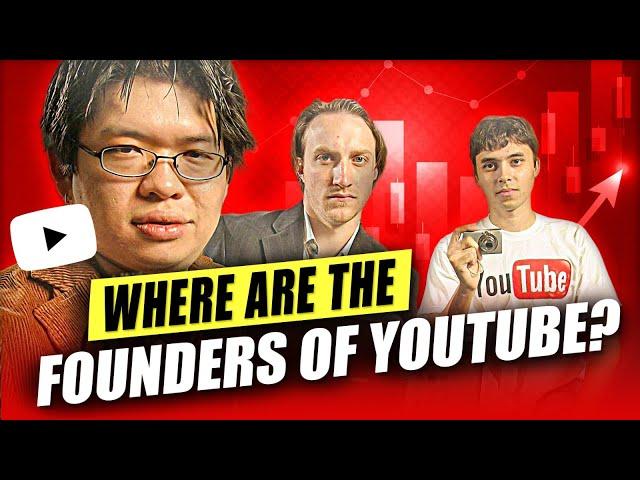In the vast expanse of the digital age, where ideas flash across screens adn stories unfold in clicks, few platforms have revolutionized the way we consume content quite like YouTube. What began as a humble vision to simplify video sharing has blossomed into a global phenomenon, shaping cultures, launching careers, and redefining entertainment.Behind this meteoric rise are three names often whispered in Silicon Valley lore: Chad Hurley, Steve Chen, and Jawed Karim—the founders who transformed a simple idea into a viral empire. Their journey,fraught with uncertainty,innovation,and a touch of serendipity,is a testament to the power of vision in an ever-connected world. This is the story of how YouTube went from a flicker of inspiration to a cornerstone of the internet.
The Early Spark: How YouTube’s Founders Turned a Simple Idea Into a Global Phenomenon
In the early 2000s, three former PayPal employees—Chad Hurley, steve Chen, and Jawed Karim—identified a gap in the digital landscape. They envisioned a platform where anyone could easily share videos, a concept born out of personal frustration. The idea was simple yet revolutionary: create a space for user-generated content that was accessible,user-amiable,and globally connected. This vision sparked the creation of YouTube, which launched in 2005.Within months, it became a cultural phenomenon, transforming the way people consumed and shared media.
Their journey was marked by key milestones that propelled YouTube from a nascent startup to a household name. Here’s a snapshot of how they turned their vision into reality:
- February 2005: Domain registered and development began.
- April 2005: First video,”Me at the zoo,” was uploaded by Jawed Karim.
- November 2005: Sequoia Capital invested $3.5 million, fueling rapid growth.
- October 2006: Acquired by Google for $1.65 billion, cementing its global influence.
| Year | Milestone |
|---|---|
| 2005 | YouTube launched |
| 2006 | Acquired by Google |
| 2007 | Partner Program introduced |
| 2010 | 1 billion views per day achieved |
Their innovative thinking and relentless drive not only disrupted the media industry but also laid the groundwork for the creator economy, empowering millions to share their stories with the world.

Building the Platform: Key Decisions That Shaped YouTube’s User Experience and Growth
When YouTube’s founders—Chad Hurley, Steve Chen, and Jawed Karim—set out to create a platform for sharing videos, they faced a series of critical decisions that would shape its user experience and trajectory. One of their earliest and most impactful choices was to prioritize simplicity. They designed an intuitive interface that allowed even non-technical users to upload, watch, and share videos effortlessly. this user-friendly approach not only lowered the barrier to entry but also encouraged widespread adoption. Additionally, they opted for HTML5 video embedding, which ensured compatibility across devices and browsers, laying the foundation for YouTube’s accessibility on a global scale.
Another cornerstone of YouTube’s growth was its community-driven model. The founders introduced features like likes, comments, and subscriptions, fostering engagement and creating a sense of belonging among users. They also made a bold decision to allow user-generated content without heavy moderation early on, which led to an explosion of creativity and diversity on the platform. Below is a snapshot of key decisions and their impact:
| Decision | Impact |
|---|---|
| Simplified interface | Increased user adoption and accessibility |
| HTML5 video embedding | Cross-device compatibility and global reach |
| Community features (likes, comments) | Enhanced user engagement and interaction |
| User-generated content | Drove creativity and content diversity |
Navigating Challenges: The Pivotal Moments That Tested YouTube’s Founders and Vision
the journey of YouTube’s founders, Chad Hurley, Steve Chen, and jawed Karim, was far from a straight path to success. In the early days, they faced technical hurdles, financial constraints, and skepticism from potential investors. Their initial vision—a dating site where users could upload videos—was a flop, but they quickly pivoted to a broader idea: a platform for sharing videos of all kinds. This adaptability became their greatest strength.They worked tirelessly, often coding through the night, to ensure the platform could handle the growing demand. Their first office was a garage, a humble beginning for what would become a global phenomenon.
Despite the challenges, they remained committed to their vision. When the platform launched in 2005, it was met with immediate success, but scaling it presented new obstacles. Bandwidth costs soared, and the site experienced frequent crashes due to the sheer volume of users. To address these issues, the founders made strategic decisions that would shape YouTube’s future:
- Focus on user experience: they prioritized seamless video playback and easy uploading.
- Seek partnerships: They partnered with content creators and advertisers to monetize the platform.
- Leverage community feedback: User input was crucial in refining features and expanding functionality.
| Challenge | Solution |
|---|---|
| High bandwidth costs | Implemented scalable infrastructure and partnerships |
| Platform crashes | Optimized server capacity and load balancing |
| Revenue generation | Introduced ad-based monetization models |
Lessons for aspiring Entrepreneurs: Actionable Takeaways From YouTube’s Journey to Dominance
The story of YouTube’s ascent is a masterclass in visionary thinking and relentless execution. Founders Chad Hurley, Steve Chen, and Jawed Karim transformed a simple idea—sharing videos online—into a global phenomenon. Their journey underscores the importance of identifying user pain points and delivering solutions that resonate universally. what began as a platform for personal video sharing evolved into a cultural cornerstone, proving that adaptability and scalability are critical for long-term success.
| Key Milestone | Impact |
|---|---|
| Launch of First Video | Set the foundation for user-generated content. |
| Integration with Google | Enabled exponential growth and global reach. |
| Introduction of Monetization | Empowered creators and ensured platform sustainability. |
Aspiring entrepreneurs can draw actionable insights from YouTube’s blueprint. Focus on simplicity: The platform’s intuitive design eliminated barriers to participation. Embrace iteration: Continuous updates and feature enhancements kept users engaged. Below are three pivotal lessons for building a scalable venture:
- Prioritize user experience: Make your product indispensable by solving real problems.
- Leverage partnerships: Collaborate with established players to amplify growth.
- Empower your community: Enable users to contribute and benefit from your platform.
Concluding Remarks
and so, the story of YouTube is not just a tale of technological innovation, but a testament to the power of vision, resilience, and timing. From a humble idea born in a garage to a global platform that reshapes how we share, connect, and consume content, YouTube’s journey is a mirror to the transformative potential of the digital age. As the founders stepped back, the platform continued to evolve, becoming a cultural cornerstone and a launchpad for countless voices, ideas, and revolutions. Their legacy is not just in the code they wrote or the company they built, but in the countless creators, viewers, and dreamers who continue to make YouTube a living, breathing ecosystem of creativity. From vision to viral, YouTube’s ascent reminds us that the next big idea might just be a click away—waiting to change the world, one video at a time.

